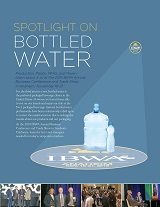Economics
Bottled Water Matters
From large cities to small towns, the U.S. bottled water industry is a critical component of our nation’s economy and infrastructure. Companies that manufacture, distribute and sell bottled water products employed about 227,000 Americans, paying them $9.9 billion in wages and benefits. Not only does the manufacture and sale of bottled water products create good jobs in the U.S., but it also contributes to the national economy as a whole via the industry’s economic ripple effect that benefits agriculture, manufacturing, construction, transportation and many other businesses whose livelihood depends on the bottled water industry. In fact, in 2019 the bottled water industry was a dynamic part of the U.S. economy, accounting for about $102.3 billion in output, or just below 1 percent of GDP. Bottled water manufacturers, along with their wholesale and retail partners, directly or indirectly employed approximately 471,700 Americans in 2013. These workers earned $25.0 billion in wages and benefits. Members of the industry and their employees paid $9.7 billion in direct federal, state and local taxes. In addition, the consumption of bottled water beverages throughout the country generated $2.7 billion in state sales taxes.
Bottled Water Market
Bottled water is the largest commercial beverage category by volume in the United States. Data provided by the Beverage Marketing Corporation show that bottled water Bottled water consumption has steadily increased in sales volume each year since 2010, while consumption of carbonated soft drinks has declined. Bottled water outsold soda for the first time in 2016 and has done so each year since (see chart). According to BMC data, Americans consumed 15.1 billions gallons of bottled water in 2020, a 5 percent increase from the 2019. Retail sales grew 4.9 percent to $36.3 billion, and per capita consumption of bottled water increased 4.5 percent, as the average American is now drinking 45.3 gallons per year.
Bottled Water Industry
The bottled water industry can be divided into two primary business models. The first model is the home and office delivery (HOD) of the three, four and five gallon bottles used with water coolers, which accounts for about 12% of the bottled water market. This segment of the bottled water market has been providing consumers with safe, quality products for over one hundred years in the United States. The second model is retail sales of bottled water to consumers in 2 ½ gallon, 1 gallon, and smaller sized bottles (e.g., half liter and liter), generally through convenience and grocery stores, as well as vending machines. Retail business accounts for about 88% of the bottled water market, and is the largest and fastest growing segment of the United States bottled water industry. The vast majority of bottled water companies in the United States are very small (10 employees or less) and generate less than $10 million in sales annually. These are local family entrepreneurs with deep roots and strong ties within their communities.
Bottled Water Philanthropy
Clean, safe water is a critical need for citizens and first responders immediately following a natural disaster or other catastrophic event. Unfortunately, the availability of water from public water systems is often compromised in the aftermath of such an event. During these times, bottled water is the best option to deliver clean safe drinking water quickly into affected areas. The bottled water industry is always been at the forefront of relief efforts during natural disasters and other catastrophic events. Throughout the years, bottled water companies have immediately responded to the need for clean water after natural disasters, such as Hurricanes Andrew, Charlie, and Katrina; earthquakes; forest fires in the West; or the terrorist attacks on the Pentagon and World Trade Center in 2001. The bottled water industry looks to IBWA to help coordinate activities with state and federal government agencies and organizations, such as the American Red Cross and Salvation Army. Working together, we determine the quickest and most effective way to deliver safe bottled water into affected areas to augment other relief efforts. Bottled water companies also work with municipal water systems to provide the public with clean, safe bottled water when the public drinking water infrastructure is compromised or when the water does not meet state and federal health standards. The efforts of the industry to provide crucial drinking water to citizens afflicted by disasters are contingent on a viable commercial market. The commercial market provides them with the capital and resources to respond when needed. The industry cannot exist only for disaster response as some industry critics would have people believe. The need for such philanthropic efforts can only be seen when people need it the most. To discourage the use of bottled water or question the safety of bottled water does a disservice to an industry that is called upon every year to provide much needed drinking water.




























